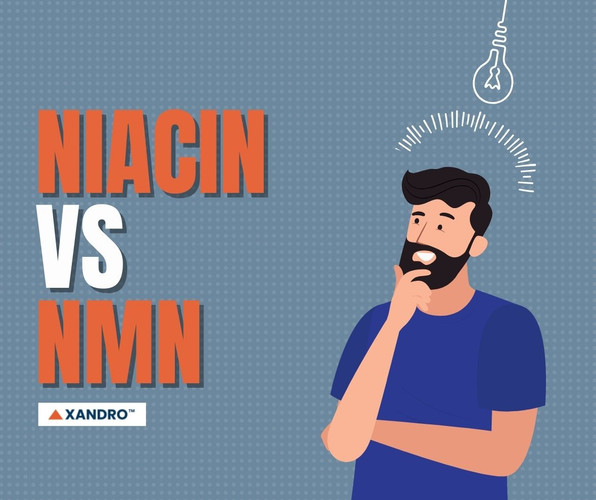Is Niacin as Effective as NMN for Longevity?
16th Jan 2024
Niacin vs NMN: Which is Better for Longevity?
Niacin and NMN are precursors to nicotinamide adenine dinucleotide (NAD+), which is a coenzyme used in various metabolic processes in our body, such as energy metabolism and DNA repair. As our NAD+ levels decline as we age, it’s been suggested to supplement with NAD+ precursors to promote longevity and healthy aging.
But which is better?
Is Niacin the Same as NMN?
No, Niacin is vitamin B3 whereas NMN is nicotinamide mononucleotide, a separate enzyme. They are both used differently by the body. In terms of both being used to create NAD+, they differ in their mechanisms and effectiveness.
Is Niacin Good for Longevity?
Niacin has been used in clinical trials for decades as a way to improve cholesterol, although this has been replaced because of statins. A 2017 review by Cochrane showed that niacin most likely won’t extend lifespan, but it still has a lot of benefits for our health.
Too much niacin, though, can also cause flushing and increased glucose levels in some people. The flush, however, is not dangerous, and an instant-release niacin supplement is most likely the safest one over an extended-release one (which can prevent flushing).
Is NMN Better than Niacin for Longevity?
Niacin is first converted into nicotinic acid mononucleotide (NAMN) and then used to generate nicotinic acid adenine dinucleotide (NAAD), which is then converted to NAD+. NMN is a direct precursor to NAD+ and can do this more efficiently. Niacin is too far down in the pathway to do much in creating NAD+, especially since it’s used in many other processes in our bodies, so it’s likely all used before it can be converted anyway.
While more research is needed in humans, it’s been suggested that NMN is more efficient in increasing NAD+ levels and promoting healthy aging. Preliminary studies found that taking NMN supplements improved mitochondrial function, glucose tolerance and lifespan in mice, while taking niacin didn’t do this.
Can You Take Niacin and NMN Together?
Yes, while related, NMN is not vitamin B3, so the two are different compounds used in our bodies. Your daily multivitamin contains niacin and taking an NMN supplement on top won’t do your body any harm.
Can you Take B3 Instead of NMN? As mentioned, vitamin B3 has many benefits on the body, such as helping keep our nervous system, digestive system and skin healthy, but since it’s so far in the chain to create NAD+, it most likely won’t have the longevity benefits you’re taking it for. As NMN is a direct precursor to NAD+, you’re better off taking NMN.
Is Nicotinamide the Same as NMN?
Is nicotinamide vitamin B3? NMN stands for nicotinamide mononucleotide, which is different from nicotinamide (NAM), a form of vitamin B3 like niacin (nicotinic acid). You may have also heard of niacinamide, especially if you’re into skincare, and this is the same as nicotinamide.
Whereas you get niacin from plant products like nuts, seeds and green vegetables, you get nicotinamide from meat and poultry. Unlike niacin, nicotinamide doesn’t cause flushing.
It’s not recommended to take NAM to increase NAD+ levels, as it’s too early in the pathway that generates NAD+, similar to niacin. NAM is converted into NMN which then turns into NAD+.
NAM may also prevent sirtuins from working, the enzymes that help protect our DNA and the epigenome. NAD+ can also convert backward into NAM to allow sirtuins to work, but if there’s too much NAM in our bodies, this can prevent the conversion of NAD+ into NAM.
So, in terms of niacinamide vs NMN, NMN is the better option to take.
NMN vs NR
NR (nicotinamide riboside) is another form of vitamin B3 that has been shown to improve blood NAD+. NMN is one step closer as a precursor to NAD+, but different tissues and organs might prefer one over the other.
Chemically, NMN and NR are the same, except that NMN also has one phosphate group present. The presence of this phosphate group prevents NMN from entering cells, whereas NR can enter. NR is also unstable and hard to absorb, unlike NMN.
NMN still needs more studies about safety and oral availability, although a study has shown doses from 100 to 500mg are safe and effective. NR, on the other hand, is well tolerated up to 2g daily, with no flushing or severe side effects.
What Can I Take Instead of NMN?
Since NMN supplements are banned in the US due to the FDA researching its potential as a new drug, if it’s longevity benefits you’re after, you can consider taking:
- NR: Increases NAD+ levels, may slow down the pace of weight gain, may boost insulin levels and increase brain and heart health.
- Coenzyme Q10: May boost NAD+ levels, is used in energy production in cells and has antioxidant properties.
- Resveratrol: Activates sirtuins, which may increase NAD+ levels.
- Curcumin: Has antioxidant, anti-inflammatory and anti-cancer properties and may increase NAD+ levels.
So, is an NMN supplement worth it? Right now, rather than lifespan, an NMN supplement might be able to help with ‘healthspan’, helping us stay healthier and hopefully, live for longer. It has the highest bioavailability of all the vitamin B forms mentioned here, is a direct NAD+ booster and is well-tolerated in the body.
If you want to see if NMN has an effect on your body or want to take it for its longevity benefits, try out Xandro Lab’s Pure NMN Capsules or Pure NMN Powder, whichever suits your preferences!
